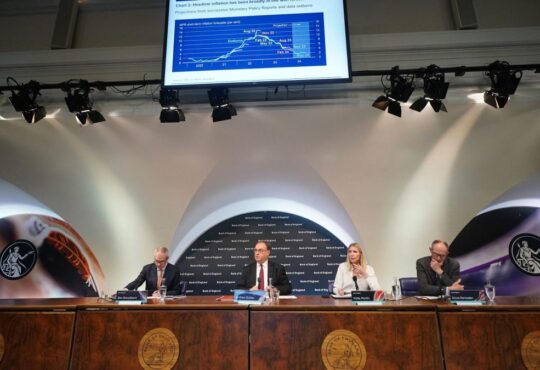
That echoes professional forecasters, who assign the highest probability on record to a recession happening within the next year.
I agree, next year is likely to be a difficult year for the economy.
A combination of higher mortgage rates and energy prices are likely to cause recessions in the UK, Europe and the US.
However, given this recession is so widely forecast and the stock market already sold off sharply in 2022, it suggests that markets already know a recession is coming.
Recession looms over markets in 2023
It is sometimes helpful to look at previous market behaviour to try to find a blueprint for the path forward.
Let us reflect on 2022, by the end of September this year, the S&P 500 had declined 25% from its peak.
Historically, following this level of decline, the stock market has tended to be higher a year later.
There have only been two exceptions since 1950s, the 2008 financial crisis and the bursting of the dot-com bubble in 2000.
Let us take each one in turn and see whether we are in a different position now than we were back then.
Unlike in 2008, the vast majority of Americans are now on long term fixed rate mortgages.
There has also been much less subprime mortgage lending and the banks are much better capitalised. So, a financial crisis like 2008 is not my base case.
Let us move onto 2000. S&P 500 valuations did start 2022 not far off those seen during the dot-com bubble.
However, high valuations could largely be attributed to growth stocks.
Despite underperforming in 2022, growth stocks are still not particularly cheap by historical standards.
Value stocks, however, are now quite reasonably priced compared with history.
I have a higher conviction in value stocks performing well next year than I do for growth stocks, although they could both rise as markets look ahead to an economic recovery in 2024.
A key risk to equities is that consensus 12-month forward earnings expectations currently look too high.
S&P 500 earnings expectations have only declined by about 5% from their recent peak.
A recession is likely to lead to further reductions in earnings expectations.
‘Scars’ of the energy play will linger in 2023
In a moderate recession, 12-month forward earnings estimates could decline somewhere around 10% to 20% from the peak, as they did in the 1990s or early 2000s.
While some argue that when these earnings downgrades materialise, they will lead the stock market lower, the market may have already priced in some further downgrades to consensus forecasts.
For example, at the beginning of 2022, US bank stocks were reasonably valued at 12x earnings.
Consensus 12-month forward earnings forecasts for the banks have actually risen about 10% over the course of the year – yet bank stocks fell about 35% from peak to trough.
Stocks could rally even as earnings expectations decline. It would not be the first time this has happened.
In the early 1990s, stocks rallied as 12-month forward earnings expectations fell.
While it is possible that falling earnings forecasts might still lead stocks lower, if the magnitude of the decline in earnings is moderate then it would likely only lead to limited further downside for reasonably valued stocks, relative to the declines already seen in 2022.
It is true that it would be unusual for the stock market to have bottomed already—that does not tend to occur before the unemployment rate has started to rise and the Federal Reserve (Fed) has started to cut interest rates.
However, the market has already declined much more than usual before jobs have really started to be lost.
Given this is the most widely anticipated recession in the last 50 years, there is a chance that equity markets could have priced it in sooner than they normally do.
Overall, though it is possible that we have not yet seen the bottom for equity markets, I think the risk versus reward for equities in 2023 has improved, given the declines seen in 2022.
With quite a lot of bad news already factored in, the potential for further downside is more limited than at the start of 2022.
Importantly, the probability that stocks will be higher by the end of next year has increased sufficiently to make it my base case.
A recession is likely coming but I think the market probably already knows that.
If you are waiting for the recession before buying stocks, the key question is who is going to be surprised when the recession arrives and therefore be willing to sell you their stocks cheaper than they currently are.
Normally, recessions surprise investors. If the investors at the pension fund conference are anything to go by, then it suggests few will be surprised this time around.
Mike Bell is a global market strategist at JP Morgan Asset Management






